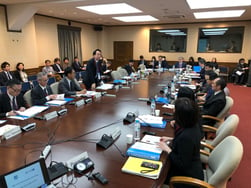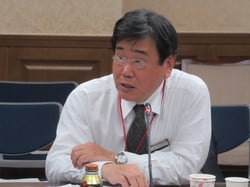News from Asia and the Pacific
Researchers, Economists, and Policymakers Discuss Sovereign and Corporate Debt Issues in Tokyo
February 4, 2020, Tokyo – In an effort to tackle increasing challenges with sovereign and corporate debt, experts in debt management from Asia and the US today gathered in Tokyo to share research findings and exchange views with policymakers on sovereign default risk and its macroeconomic implications and other related topics.
 The economic workshop, co-organized by the IMF Regional Office for Asia and the Pacific (OAP) and the Policy Research Institute (PRI) of Japan’s Finance Ministry, provided an opportunity for researchers and policymakers to learn from frontier research on debt issues and to increase capacity for policy analysis.
The economic workshop, co-organized by the IMF Regional Office for Asia and the Pacific (OAP) and the Policy Research Institute (PRI) of Japan’s Finance Ministry, provided an opportunity for researchers and policymakers to learn from frontier research on debt issues and to increase capacity for policy analysis.
In his opening remarks, PRI President Yukihiro Oshika shared with the participants how sovereign debt is increasing in a number of mostly advanced economies and in East Asian countries, including Japan, because demographic changes are sharply driving up pension and medical costs. He discussed policy measures Japan is taking to help address this challenge and secure fiscal sustainability. On corporate debt, he spoke about Japan’s experience with elevated bad loans after the collapse of the bubble economy and some of the actions taken subsequently to help resolve corporate debt issues in the late 1990s and early 2000s, and he noted this would be a useful example for other countries today. “It is truly valuable to share the latest research on these important issues,” he said, encouraging direct interaction between academics and policymakers.
During the day-long workshop, about 20 academic researchers and economists presented the latest research on the effects of sovereign default risk on the macroeconomy, sovereign default risk and fiscal policy rules, and debt restructuring and resolution of corporate debt. About 30 people from relevant offices joined the occasion to learn from the presentations and discussions.
 "We have discussed several important aspects of sovereign and corporate debt in advanced and emerging market economies in Asia,” said OAP Director Sumi Chikahisa in his closing remarks, adding that there are other prominent and emerging debt issues confronted by Asian countries such as the currency and creditor structure of government debt and the bank-sovereign nexus. “OAP hopes these issues will be discussed between academic researchers and policymakers in future workshops to encourage both parties to find desirable policy responses to these problems.
"We have discussed several important aspects of sovereign and corporate debt in advanced and emerging market economies in Asia,” said OAP Director Sumi Chikahisa in his closing remarks, adding that there are other prominent and emerging debt issues confronted by Asian countries such as the currency and creditor structure of government debt and the bank-sovereign nexus. “OAP hopes these issues will be discussed between academic researchers and policymakers in future workshops to encourage both parties to find desirable policy responses to these problems.
The workshop was a follow-up event to the 2018 workshop on the same topic.


